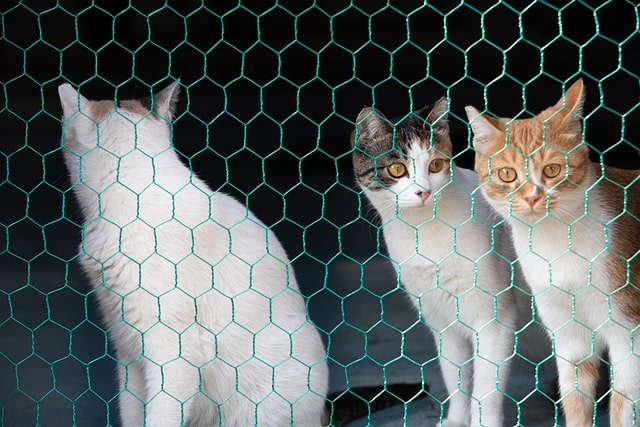
Noah syndrome is like It is called a mental disorder that leads some people to surround themselves at home with a very large number of animals despite not being able to care for them well.
In this article we are going to delve a little deeper into this syndrome to understand what it is, what it implies, how to detect it, but above all, what to do before the detection of a case of Noah Syndrome. These cases are usually complicated because the neighbors of these people may have problems with odors, dirt, noise, etc.
the noah syndrome
According to experts, this disorder consisting of obsessively accumulating animals at home, is a serious mental health, physical health and public health problem. Despite this, there are few investigations that attack this issue and its solutions.
What is Noah's syndrome?
This metal disorder leads people to collect and accumulate street animals in their own home. On many occasions it is related to an unconditional love for animals, which in the past was poorly attended and leads to a bad relationship with this feeling. Above all it occurs with dogs and cats, which are usually the typical companion animals, which can be seen the most on the streets and which is easier to gain their trust to take them home.
The problem is not that a person wants to rescue as many animals as possible from the street, but rather that people with this disorder they do not provide care that these animals need. It implies bad conditions for the animals, for the person suffering from the disorder but also for those who live nearby. In fact, most cases of Noah syndrome come to the authorities due to complaints from neighbors or from the social services themselves.

What people have Noah syndrome?
Due to the reported cases related to this syndrome, it has been possible to establish the most abundant profile of the people who suffer from it. They are usually women aged between 50 and 60 years old, mostly single, widowed or divorced, with a medium to low economic level.
The homes of these people have an alarming messy and unhealthy state. In addition, suffering from this syndrome has been linked to others such as: dementia, OCD, personality disorder, delusional disorder, childhood attachment disorder or bestiality.
Among people who have been found to have Noah syndrome, was established in 2016 different categories (still pending study and revision):
- overwhelmed accumulator
- overloaded accumulator
- Compulsive Caregiver Hoarder
- exploiting accumulator
How to detect Noah syndrome?
It is important distinguish between a person who suffers from this disorder and another who voluntarily tries to take care of or take animals off the street responsibly. This line may seem blurred at times, so we must look at several factors:
- The animals that the person has are of such a volume that cannot be cared for or kept in good condition (irresponsible behavior). There is a lack of space for the animals, there is no veterinary care, food and hygiene are deficient, etc. All of this leads to health problems for the animals.
- Animals They go into the house but don't come out. that is, the person does not try to rescue them and then find them another home to continue their rescue of animals in poor condition.
- The person suffering from this disorder prevent other people from entering your home.
- Absolute denial of suffering from any type of problem. From their point of view they are helping the animals by getting them off the street. This denial can become violent if someone tries to make him see his inability to care for all those animals.
On occasion these people may recognize that they have problems keeping the animals (usually talking about the economic issue). On these occasions it is easier to address the problem from the perspective of taking them to places where they can better serve them. But the most common is denial of having a problem.

What to do when detecting a case of Noah Syndrome?
The best way to act in a case of Noah Syndrome is Notify local authorities. In Spain you can call 112 who will notify Social Services. It is important not to confront these people as they will become defensive. Let's remember that they think they are doing a good job with these animals and most likely believe that those who are against having them is because they do not want the animals.
Alternatively contact a local protector who will notify the local police, civil guard or whoever is competent that problem. The protectors are usually in contact with the agents of each place.
Therefore, the best option is avoid confrontation and notify the authorities. And above all, be patient and understand that the person has a disorder, something that makes them have a behavior that, although it may seem annoying and unhealthy to the rest, seems right to them. The authorities will take care of putting a solution.
Of course, when giving the notice, it is important communicate that the person who has these animals almost certainly suffers from a mental disorder. This can help officers when they show up at your home.
Can Noah Syndrome be treated?
When the problem is detected, it is It is important that mental health accompany the patient during the removal of all animals from their home. You have to be aware of the violent reaction that this act can unleash. These people believe they are saviors and someone is preventing them from continuing their good work.
The treatment of the person (from psychiatry and psychology), will try to reduce the delusions that haunt the patient around the obsessive accumulation of animals. It will try to come to a understanding of the problem as well as the creation of new and healthy habits for the patient. These people are going to need a lot of support to be able to quickly detect if the Syndrome wakes up again.
Each treatment, yes, is particular. Each person can develop this pathology for different reasons and to different degrees, so each person must be treated specifically. Let us also remember the association that this syndrome has with other disorders.
This syndrome is classified as a hoarding disorder, which goes beyond a mental health problem, as we have seen. And what does social isolation entail? for those who suffer from it, as well as for the animals they collect.